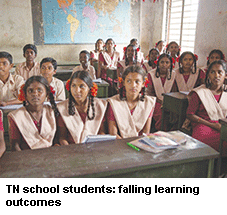 The Tamil Nadu state government is likely to continue with the no-detention until class VIII policy stipulated by section 30 (1) of the Right of Children to Free and Compulsory Education (RTE) Act, 2009, following the decision of the Central Advisory Board of Education (CABE) — the country’s apex advisory body on education — to leave the choice of retaining or abolishing the no-detention policy to state governments. Following the 64th meeting of CABE on October 25 in New Delhi, Union minister for human resource development (HRD) Prakash Javadekar clarified that the no-detention provision of the RTE Act would be made mandatory in all 29 states and seven Union territories for children until class V. However, state governments will have the discretion to persist with the policy until class VIII. The TSR Subramanian Committee’s Report on the National Policy on Education 2016 (see cover story) had recommended detention of children who don’t make the cut for promotion after class V.
The Tamil Nadu state government is likely to continue with the no-detention until class VIII policy stipulated by section 30 (1) of the Right of Children to Free and Compulsory Education (RTE) Act, 2009, following the decision of the Central Advisory Board of Education (CABE) — the country’s apex advisory body on education — to leave the choice of retaining or abolishing the no-detention policy to state governments. Following the 64th meeting of CABE on October 25 in New Delhi, Union minister for human resource development (HRD) Prakash Javadekar clarified that the no-detention provision of the RTE Act would be made mandatory in all 29 states and seven Union territories for children until class V. However, state governments will have the discretion to persist with the policy until class VIII. The TSR Subramanian Committee’s Report on the National Policy on Education 2016 (see cover story) had recommended detention of children who don’t make the cut for promotion after class V.
The decision to allow state governments to take a call was made after some of the 21 state education ministers who attended the CABE meeting complained that learning outcomes in primary and upper primary schools are falling sharply because of the no-detention until class VIII provision of the RTE Act. Other key decisions taken at the meeting include: defining learning outcomes of students in each class and including them in state governments’ RTE Rules, amending the Act to extend the deadline for teacher training from 2015 to 2020 and completing the task of training 500,000 untrained teachers in the next five years.
Section 30 (1) was inserted into the RTE Act by former Union HRD minister Kapil Sibal to reduce exams stress, and replace exams with Continuous and Comprehensive Evaluation (CCE) under s. 29 (2) (h) of the Act. Under this provision, schools are expected to evaluate students’ learning continuously rather than subject them to stressful make-or-break exams. However, the great majority of primary teachers haven’t been adequately briefed about CCE, with the result that they administer weekly/monthly tests, which has paradoxically increased children and teachers’ stress.
The Tamil Nadu government’s stand in favour of the no-detention policy at the CABE meeting has evoked mixed response from educationists and school administrators in the state. Principals and teachers in the 53,000 government primary-secondaries affiliated with the Tamil Nadu State Board of School Education (TNSBSE) are seriously worried about falling learning outcomes which they attribute to s.30 (1). “Many students, who cannot read or write simple sentences despite introduction of child-centric activity-based learning (ABL) in primary school, are continuously promoted to class VIII. Therefore, when they enter high school in class IX, they are unable to cope with the curriculum and exams,” says the headmistress of a government upper primary school in Coimbatore.
Several surveys such as the National Achievement Survey (NAS) 2015 commissioned by the Delhi-based National Council for Educational Research and Training (NCERT), and other government and private organisations which have highlighted poor learning outcomes in Tamil Nadu’s primaries, are making teachers and school heads nostalgic about the traditional terminal and annual exams that detained classroom laggards.“The no-detention policy should be limited to class V after which schools should be allowed to detain students who perform poorly, but not before giving them a second chance to pass a re-exam. The lack of long-term learning outcomes and failures in higher classes across the country are proof that CCE has not been very effective,” says Dr. C. Satish, director of the Paavai Group of Schools, Namakkal.
However, proponents of the no-detention policy in Tamil Nadu argue that poor learning outcomes in primary and upper primary education are the result of teachers being inadequately trained to implement ABL and CCE. Undoubtedly there is merit in this argument. However, training the state’s 75,096 government primary teachers and 28,759 in government-aided schools is intimately connected with the larger issue of professional development of the country’s 9 million teachers, about which the Subramanian Committee has made several constructive recommendations. But that’s a long-haul programme. Meanwhile students’ learning outcomes are falling continuously.
In the circumstances, the Tamil Nadu government — currently paralysed by the mysterious illness of chief minister J. Jayalalithaa — needs to reconsider its stand on the no-detention until class VIII policy.
Hemalatha Raghupathi (Chennai)























